- Home
- Linda Castillo
Breaking Silence Page 2
Breaking Silence Read online
Page 2
“Holy shit,” he said. “Where did that come from?”
“That’d be Bess.” June Humerick lowered her voice. “Poor old girl.”
The ewe’s head lay in a pool of muck and blood. The mouth was partially open, revealing a row of tiny white teeth. A pink tongue hung out like a deflated balloon. Pickles shifted the beam to study the throat area. He didn’t know how that head had been severed from the carcass, but it didn’t look like the work of some scrawny coyote. The flesh was cleanly cut. Red tissue and the pink bone of the spine jutted from the base.
“Don’t think a coyote did this.” Pickles stared, aware that the hairs on his neck were standing up like porcupine quills. “Looks more like a knife.”
“I coulda told you that.” She ran her beam along the periphery of the pen. “If I’da gotten out here faster, I’da plugged that sumbitch’s ass with lead.”
Stepping back from the severed head, Pickles swept the beam to a second carcass. He’d never been squeamish about blood, but a quivery wave of unease washed over his stomach when he saw pink entrails ripped from a belly that had been sliced open from end to end.
“What the fuck?” he said.
Taking his language in stride because she’d been known to use the same word herself on occasion, the widow Humerick walked to him and shone her light on the dead sheep. “This is just senseless.”
“If it wasn’t raining, we might have got some tracks.” Pickles swept his beam left and right. “You sure you didn’t see any lights out here?”
“I didn’t see nothin’.”
Pickles leveled his flashlight beam on the carcass. “Could be them devil worshipers down south.”
The big woman crossed to him, jabbed her thumb at the decapitated carcass. “They didn’t take nothin’ for sacrifice.”
He could tell by the widow’s expression that she wasn’t buying into the devil-worshiper theory. He wasn’t going to stand out here in the rain and snow and debate it. “Well, I’ll drive around back behind them woods and then get a report filed.”
She shot him an incredulous look. “What if they come back? What if they’re out in them woods waitin’ for you to leave so they can come hack up the rest of my sheep?”
“There ain’t no one here to arrest.”
“You could search the woods.”
“Too dark to be tromping around those woods, especially in this weather.”
“That’s just a crock of horseshit, Pickles.”
He sighed; twenty years ago, he’d have been chomping at the bit to get into those dark woods and snag him a couple of Amish-haters. The hunt would be on. Tonight, with his knees aching and a chill that went all the way to his bones, he was more than happy to wait until daylight and pass the buck to the next shift.
“I’ll talk to the chief first thing in the morning, get the ball rolling on that task force.” He started toward the gate that would take him back to the driveway and his nice warm cruiser. “You might lock them sheep in the shedrow the rest of the night.”
June held her ground. “Gonna take more than that rickety old shed to keep out whatever lunatics done this.”
“Have a nice evening.” Pickles was midway to his cruiser when his radio cracked to life. “What now?” he growled.
“Pickles, I got a ten-fifty-two out at the Slabaugh farm. David Troyer just called, said they got three people down in the manure pit.”
“Shit.” Pickles fumbled for his lapel mike. Back in the day, a cop had a radio in his cruiser. If he chose to ignore a call, he could. Now, you carried the damn thing around like some weird body part, one end clipped to your belt, one end stuck in your ear, and a microphone pinned to your chest like some damn medal. “You call EMS?”
“They’re en route. Thought you might want to get out there.”
Pickles heaved another sigh; he’d just about had all the mud and shit he could handle for one night. But he knew a manure pit could be a dangerous place. There were all sorts of nasty gases that would do you in faster than a gas chamber if you weren’t careful. “What’s the twenty on that?”
“Three six four Township Road Two.”
Pickles knew the area. It was a dirt track south of town that would be hell to traverse without a four-wheel-drive vehicle. Figuring this was the end of his Lucchese boots, he cursed. “You might want to call the chief.”
“Roger that.”
“I’m ten-seventy-six,” he said, and forced his old legs into a run.
CHAPTER 2
Insomnia is an insidious thing: a silent and invisible malady that robs the afflicted not only of sleep but also peace of mind, sometimes for months on end. It dulls the intellect, demoralizes the spirit, and eventually leaves the affected open to a host of ailments, both physical and emotional.
I’ve never been a good sleeper, but in the last couple of months my occasional sleeplessness has degenerated into chronic insomnia. Sometimes, as I lie awake in bed watching the shadows dance on the window, I wonder how long a person can go without sleep and not suffer repercussions. I wonder how and when that ax will fall on me.
I’m staring at the glowing red numbers on my alarm clock when the phone on my night table jangles. I’m so surprised by the sudden blast, I jump, then quickly reassure myself it’s Tomasetti calling to check on me. He’s a friend, lover, and fellow insomniac, the latter being one of many things we have in common.
A quick glance at the display tells me the call isn’t from John, but the station. Considering the fact that I’m the chief of police and it’s 5:00 A.M., this doesn’t bode well for whatever news awaits me on the other end of the line. Still, I’m relieved to be called away from the dark cave of my own mind.
“Chief Burkholder, it’s Mona. Sorry to wake you.”
“No problem. What’s up?”
“Got a 911 from Bishop Troyer. One of the Slabaugh boys says he’s got three people down in the manure pit out at the farm.”
Alarm rattles through me. Born and raised Amish, I’m well aware of the dangers of a poorly managed manure pit. Methane gas. Ammonia. Drowning. The Slabaughs are Amish and run a hog operation just out of town. I can tell by the smell when I drive by their place that they don’t utilize good manure management. “You call EMS?”
“They’re on the way. So is Pickles.”
“Victims still alive?”
“Far as I know.”
“Call the hospital. Let them know we have multiple vics en route.” I’m already out of bed, flipping on the light, fumbling around in the closet for my clothes. “I’ll be there in ten minutes.”
* * *
The Slabaugh farm is located on a dirt road a few miles out of town. Rain mixed with snow is coming down in earnest when I make the turn onto Township Road 2, so I jam my Explorer into four-wheel drive and hit the gas. Less than a hundred yards in, I find a Painters Mill PD cruiser stuck in the mud. I pull up beside it and stop.
The driver’s side door swings open and Pickles, my most senior officer, slogs toward me through ankle-deep mud. Opening the passenger door, he climbs into my Explorer, bringing a few pounds of sludge with him. “County ought to pave that damn road,” he grumbles as he slides in.
“EMTs make it?” I ask.
“Ain’t seen ’em.”
“This road is the only way in.” The Explorer fishtails when I hit the gas, then the big tires grab, slinging mud into the wheel wells, and we bump toward the Slabaugh farm half a mile ahead. I’m well aware that the human brain can survive only about four minutes without oxygen before suffering permanent damage, so I drive too fast, narrowly avoiding the bar ditch a couple of times.
I’m afraid of what we’ll find when we get there. Depending on how bad the ventilation is, gases emanating from a manure pit can be lethal. That’s not to mention the ever-present risk of drowning. Two years ago, a pig farmer by the name of Bud Lathy died when he went to the barn early one morning. It was cold, so the night before Bud had closed all the doors and windows. Without proper ventilation, the gases built up inside all night, suffocating several pigs. When he went out to feed them the next morning, he fell unconscious within minutes and died of asphyxiation.
“Look out!”
My headlights wash over the figure of a small boy just in time to avoid hitting him. Adrenaline sweeps through me like an electrical shock. I stomp the brake and cut the wheel hard. The truck slides, missing the boy by inches, and comes to rest crossways in the road. “Shit.”
Pickles and I throw open our doors and slosh through mud toward the boy. He’s standing in the center of the road, looking lost and terrified. Despite the cold, he’s not wearing a coat. I can tell by his flat-brimmed hat and suspenders that he’s Amish. “Are you okay?” I ask him.
He’s about twelve years old, crying hysterically, and soaked to the skin. “We need help! Mamm and Datt…” He points toward the long gravel lane behind him. “They fell in the pit!”
I don’t wait for more information. Grasping a skinny arm, I usher him to the Explorer and muscle him into the backseat. Pickles and I slide in simultaneously, then I floor the gas and we start down the gravel lane.
I look at the boy in the rearview mirror. “Are they awake?”
“No!” he sobs. “They’re sleeping! Hurry!”
A quarter mile in, the lane opens to a wide gravel area. The white clapboard house is to my right. The hog barn is straight ahead. I don’t slow down until I’m within a few feet of the barn, then I brake hard. The wheels lock, cutting ruts in the winter-dead grass. Gears grind as I ram the shifter into park. I fling open the door. My boots hit the ground before the SUV comes to a complete stop. Grabbing my Maglite, I rush around to the rear of the vehicle, throw open the hatch, and snatch up a twenty-foot section of rope. A mix of rain and snow slashes at my face as I sprint toward the barn.
I shove the door open with both hands. “Police!” I shout. The ammonia and rotten-egg stench of wet manure staggers me, but I don’t stop. I see lantern light ahead and rush toward it. Somewhere to my right, I hear a young girl keening. A teenage boy and a younger boy stand just beyond the wood rails of a large pen, looking down. Shoving open the gate to the pen, I cross to them. “Where are they?”
They point, but I already know. The concrete floor is slightly angled so that the urine and feces from the pens drain into the six-foot square hole. The steel grate cover has been removed. I spot the snow shovel and hose on the ground a few feet away and realize someone had been cleaning the pens. I shine my flashlight into the hole. Six feet down, three people lie motionless in a pool of oozing black muck.
“How long have they been down there?” I snap.
The eldest male looks to be about seventeen years old. His terrified eyes find mine. “I don’t know. Ten minutes.” He says the words through chattering teeth. His face is the color of paste. He wears trousers with suspenders. The knees are wet with muck.
I shove my finger at him. “Open every door and window in this barn right now. Do you understand? Get some air in here.”
“Ja.” Nodding, he sets off at a run.
I shine my light into the hole again. There are two male victims and one female. I can tell by their clothing that they’re Amish. The two men are facedown. Too late for them, I think. The woman is faceup. Still alive, maybe. “We’re coming down to get you!” I shout. “Can you hear me?”
None of the victims stirs.
“Hang on!” I hear movement behind me and turn, to see Pickles and the young boy approach. “Where the hell is that ambulance?” I snap.
Shaking his head, Pickles hits his mike.
I point at the boy. “Help your brothers open all the doors and windows. We need fresh air in here. If you can’t get the windows open, break them. Go! Now!”
Nodding through his tears, he turns and runs.
Cursing, I glance down at the rope in my hands. The last thing I want to do is go into that pit; I’ve heard of more than one would-be rescuer unwittingly becoming a victim himself. But there’s no way I can stand by and do nothing while a mother of four slowly asphyxiates.
That thought pounds my brain like fists. I look around for something with which to anchor the rope. Ten feet away, I spot the support beam. It’s a huge six-by-six-inch length of hundred-year-old oak sunk in concrete. I wrap the rope around the beam, yank it tight. I’m in the process of looping the other end around my hips when Pickles walks up to me. “You’re not going down there, are you?” he asks.
Ignoring the question, I walk to the pit and sit, my legs dangling over the side. “I need you to spot me.”
Pickles looks alarmed. “Chief, with all due respect…”
“Get your gloves. Lower me down.”
He looks at me as if he’s just been told he’ll be facing execution by firing squad. “You go into that pit without a respirator, and you’ll be joining the other three.”
“You got a better idea?” I snap.
“No, damn it.” He doesn’t make a move toward the rope. “Maybe we could loop the rope around them, drag them out one at a time.”
“Goddamn it, Pickles. She’s dying.” I scoot closer to the edge.
He grabs my arm. “Kate, you ain’t got no choice but to wait for the fire department.”
I shake off his hand a little too roughly. But I know he’s right. It would be worse than foolhardy for me to go down there. Some might even call it stupid. But I’m not always good at doing the smart thing, especially if someone’s life is at stake. Or if there are kids involved. Urgency and indecision pummel me. I think of the children growing up without their parents and I want to scream with the injustice of it. In the last months, I’ve seen too many bad things happen to too many good people.
“Let’s bring them up,” I say after a moment.
Looking relieved, Pickles loosens the rope from around the beam, feeds me the slack. I get to my feet and step out of the loop. Standing at the edge of the pit, I widen the loop and toss it into the hole. Vaguely, I’m aware of the distant blare of a siren, but I don’t pause. All I can think is that every second could mean the difference between life and death.
I guide the looped end of the rope toward the female victim. She’s faceup, which tells me she probably hasn’t drowned. If she hasn’t succumbed to the gases, there’s still a chance.…
She’s closest to the near wall, almost directly below me, which means she’ll be relatively easy to capture with the rope. Planting my feet solidly at the edge of the pit, I lean forward and extend my arm, trying to position the loop around the upper part of her body. A stiff cable would have been more suitable, but I don’t have one handy and I don’t want to waste time going back to my vehicle, so I’ve no choice but to work with what I’ve got.
After several tries, I’m able to drag the loop over the victim’s arm. I jiggle the rope, work it up her arm all the way to her shoulder, then over her head, and draw it tight. It won’t be a comfortable ride up, but I figure a few rope burns are a lot better than being dead.
“I’ve got her!” I shout. “Pull!”
Pickles glances around, spots the eldest boy a few feet away, and whistles to get his attention. “Give us a hand!”
The boy rushes over, grabs the rope, wrapping it several times around his bare fist. Hope is wild in his eyes. “Okay!”
In tandem, we begin to pull. The slack goes out of the rope. The woman’s arm lifts out of the muck when the rope goes taut. Even though there are three of us, pulling 120 pounds out of thick muck is no easy task. Grunts and growls sound behind me as Pickles and the boy strain. Boots slide and scrape against wet concrete. I use my weight, leaning hard against the rope. I didn’t think to put on my gloves, and the rope cuts painfully into my palms, but I put every ounce of strength I possess into the task.
With painful slowness, the woman’s limp body inches out of the muck—first her head and shoulders, her torso and hips, and finally her legs and feet. I dig in with my boots, heaving against the rope. I’m too far from the pit now to see the victim, but I can hear her body scraping up the wall as we pull her upward.
When I see her arm and the top of her head at the rim, I glance back at Pickles. “Keep the rope taut.”
His face is red with exertion, but he gives me a nod. I slide my hand along the rope until I reach the victim. Putting my hands beneath her shoulders, I give Pickles a nod. “Pull!”
I guide the victim onto the concrete. The first thing I notice is that her skin is cold to the touch. Her clothes are soaked with muck. Her lips are blue. I see tea-colored water in her mouth, so I drop to my knees and roll her onto her side. Voices and the shuffle of shoes sound behind me. I jolt when someone places a hand on my back. I look up, to see a uniformed firefighter and young EMT looking down at me. Both men carry resuscitation bags in their hands.
“We’ll take it from here,” the EMT says.
I look down at the victim. Filmy eyes stare back at me, and in that instant I know she’s gone. The realization makes me want to slam my fist against the concrete. In the smoggy haze of my thoughts, I’m aware of the teenage boy coming up beside me, looking down at his mother. I hear the girl crying nearby. Another child falls to his knees, screaming for his mamm. That’s when it hits me that these kids are alone.
The next thing I know, someone—the firefighter—puts his hands beneath my arms and pulls me to my feet. I’m in the way, I realize. I feel shaky and cold, and I wonder if it’s the gases from the pit that have rendered me useless or if it’s the effects of my own impotent emotions.
The EMT kneels next to the woman, placing the mask over her face. I hear the whoosh of air as he compresses the bag, forcing oxygen into her lungs. A few feet away, two respirator-clad firefighters lower rescue equipment into the pit.
I look down at my hands. They’re slick with a rancid mix of water, blood, manure, and mud. It’s sticky on my skin, gritty between my fingers. I see rope burns on the insides of my knuckles and realize the blood is mine, but I don’t feel the sting. At the moment, I don’t even smell the manure. All I can do is stand there and watch the paramedics work frantically to resuscitate the motionless woman.
-->

 A Hero to Hold
A Hero to Hold A Whisper in the Dark
A Whisper in the Dark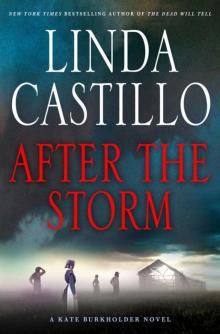 After the Storm
After the Storm A Baby Before Dawn
A Baby Before Dawn Breaking Silence
Breaking Silence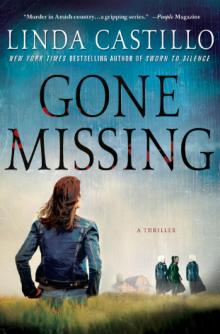 Gone Missing
Gone Missing Long Lost
Long Lost Midnight Run
Midnight Run The Dead Will Tell
The Dead Will Tell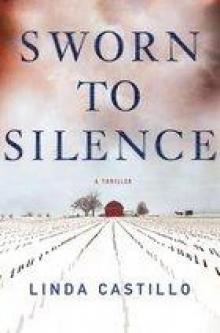 Sworn to Silence
Sworn to Silence Lay Down the Law
Lay Down the Law Safe Before Dawn
Safe Before Dawn Depth Perception
Depth Perception Seeds of Deception
Seeds of Deception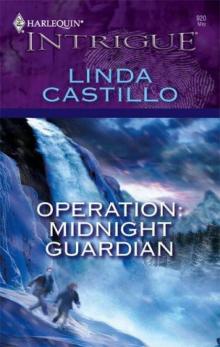 Operation: Midnight Guardian
Operation: Midnight Guardian The Perfect Victim
The Perfect Victim Operation: Midnight Tango
Operation: Midnight Tango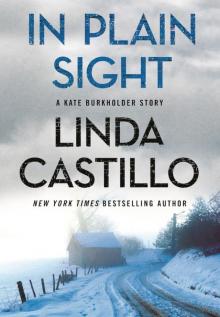 In Plain Sight (Kate Burkholder)
In Plain Sight (Kate Burkholder) Shamed
Shamed Fallen
Fallen Her Last Breath
Her Last Breath Remember the Night (Men in Blue)
Remember the Night (Men in Blue) Dead Reckoning
Dead Reckoning Cops and ... Lovers?
Cops and ... Lovers? The Pact
The Pact A Simple Murder
A Simple Murder Among the Wicked
Among the Wicked In the Dead of Night
In the Dead of Night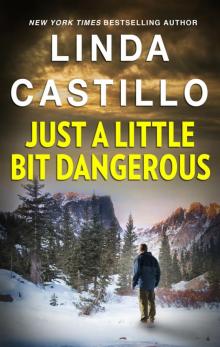 Just a Little Bit Dangerous
Just a Little Bit Dangerous The Phoenix Encounter
The Phoenix Encounter In Dark Company
In Dark Company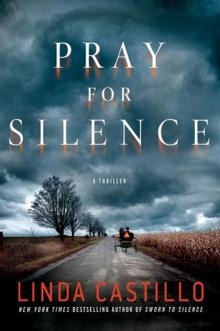 Pray for Silence
Pray for Silence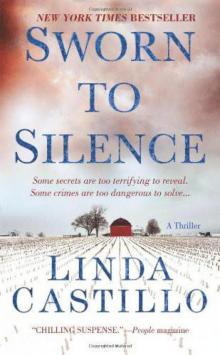 Kate Burkholder 01-Sworn to Silence
Kate Burkholder 01-Sworn to Silence Remember the Night
Remember the Night Operation: Midnight Rendezvous
Operation: Midnight Rendezvous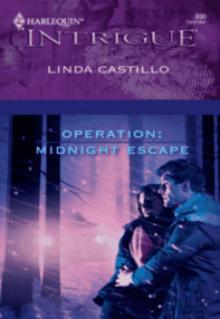 Operation: Midnight Escape
Operation: Midnight Escape The Dead Will Tell: A Kate Burkholder Novel
The Dead Will Tell: A Kate Burkholder Novel Seeds of Deception: A Kate Burkholder Short Story
Seeds of Deception: A Kate Burkholder Short Story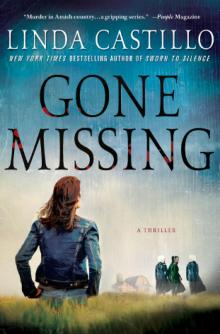 Gone Missing (Kate Burkholder 4) kb-4
Gone Missing (Kate Burkholder 4) kb-4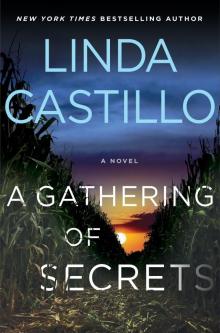 A Gathering of Secrets
A Gathering of Secrets Seeds of Deception: A Kate Burkholder Short Story (Kindle Single)
Seeds of Deception: A Kate Burkholder Short Story (Kindle Single)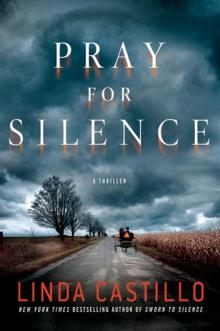 Pray for Silence kb-2
Pray for Silence kb-2 Operation: Midnight Cowboy
Operation: Midnight Cowboy In Dark Company_A Kate Burkholder Short Mystery
In Dark Company_A Kate Burkholder Short Mystery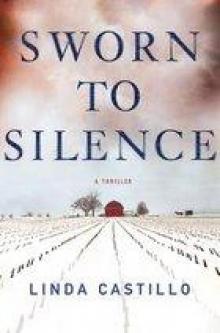 Sworn to Silence kb-1
Sworn to Silence kb-1 Her Last Breath: A Kate Burkholder Novel
Her Last Breath: A Kate Burkholder Novel Among the Wicked: A Kate Burkholder Novel
Among the Wicked: A Kate Burkholder Novel Breaking Silence kb-3
Breaking Silence kb-3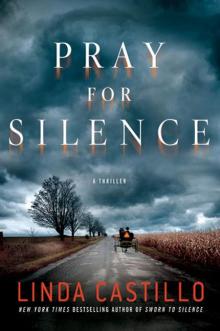 Kate Burkholder 2 - Pray for Silence
Kate Burkholder 2 - Pray for Silence Long Lost: A Kate Burkholder Short Story
Long Lost: A Kate Burkholder Short Story